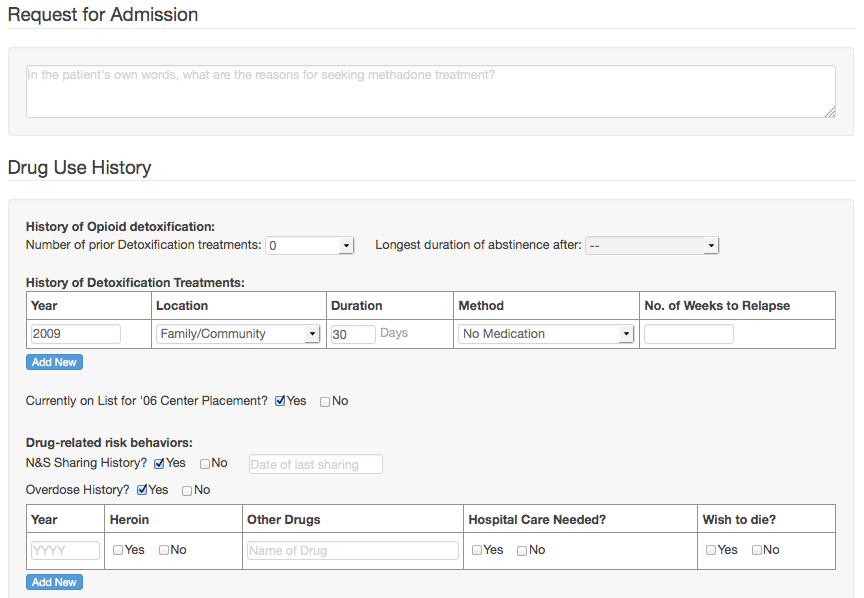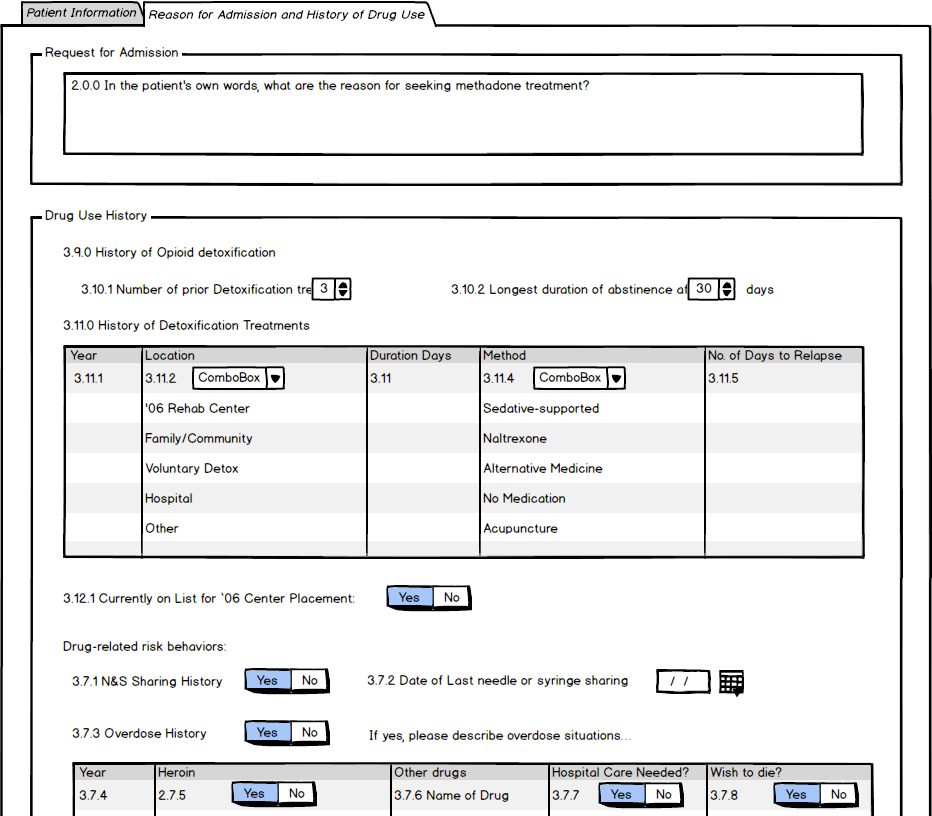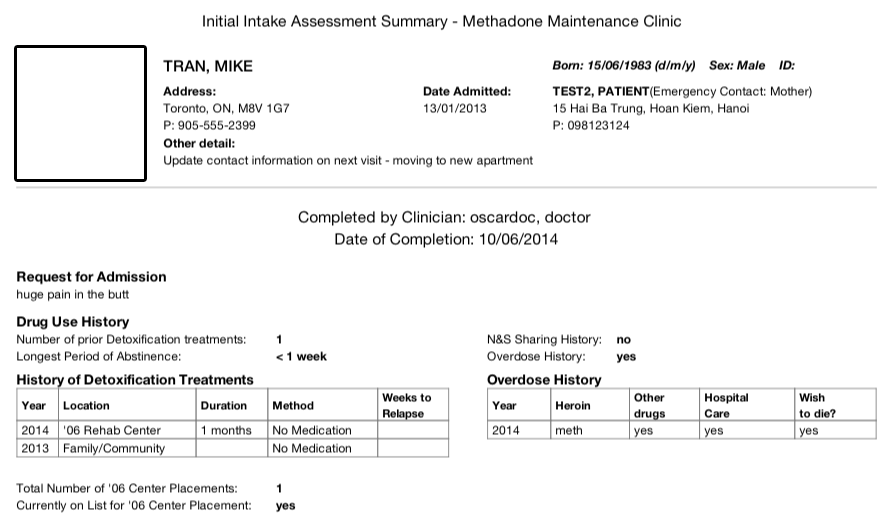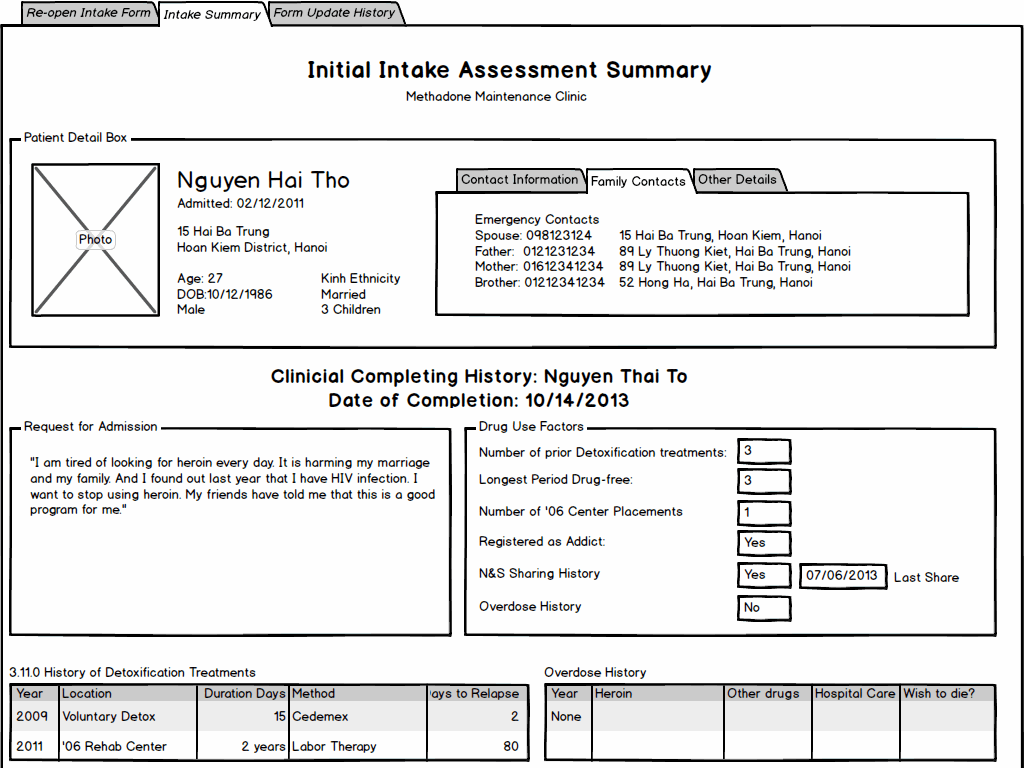FHI360: Mockups Making a Difference in HIV Prevention
 FHI360 is a non-profit organization based in Durham, North Carolina with projects around the world. Deen Gu from their Vietnam office contacted me to tell me how they're using Balsamiq Mockups to design electronic medical records (EMR) software for monitoring heroin treatment and HIV transmission in Vietnam, where infection rates are high. They are working to support treatment clinics across the country to help heroin users break their addiction via methadone, a non-addictive synthetic opioid.
FHI360 is a non-profit organization based in Durham, North Carolina with projects around the world. Deen Gu from their Vietnam office contacted me to tell me how they're using Balsamiq Mockups to design electronic medical records (EMR) software for monitoring heroin treatment and HIV transmission in Vietnam, where infection rates are high. They are working to support treatment clinics across the country to help heroin users break their addiction via methadone, a non-addictive synthetic opioid.
Deen described the backdrop of their project this way:
As of December 2013, Vietnam had 74 methadone maintenance treatment (MMT) clinics, mostly clustered in urban areas, serving about 15,000 patients. The goal of the national MMT program is to serve 80,000 patients in several hundred clinics by 2015. Having so many new clinics and patients requires the development of an electronic medical records system (EMR) to support the new growth. Right now, all clinics are using a combination of paper forms and Excel spreadsheets.
He then told me about the specific use of Balsamiq Mockups in the creation of the EMR software they are creating for the new clinics.
As of today, we finished a proof-of-concept demonstration version of the EMR software, and presented it to USAID and local government partners. The programming was done in only 10 weeks, which is a testament to how using Balsamiq can speed up development of a software. The donors and government partners really liked it and now we are moving into Phase 2 where we finish developing the program and pilot the software in 4 locations. We are very excited for this project and the impact it can make in easing the burden of clinic staff.
I corresponded with Deen and Joseph Dal Molin, a contributing expert on EMR systems, to learn more about them and their important work.
Q&A with FHI360 Vietnam
What's the story behind FHI 360?
Deen: FHI360 is an NGO that works in health and education in many developing countries across the world. Most of the money comes from USAID contracts; The Vietnam office focuses entirely on HIV and is funded by PEPFAR (President Bush’s initiative) through USAID.
While HIV is not as big of an issue here as in Africa, Vietnamese face huge discrimination and stigma barriers if they are identified as HIV+ in their communities. As a result, almost 8% of HIV infected people die each year, compared with 4-6% in most African countries. Only Zimbabwe, Burma, Burundi, Cambodia, and DRC have higher death rates per year.
Methadone treatment is intimately linked to HIV in Vietnam because the epidemic here is driven by sharing needles, i.e., heroin use. To combat heroin addition, people can go on a drug called methadone to alleviate their urge for the next “fix”.
What is your role there?
Deen: My role here mainly focuses on the intersection of technology and data use. Most for-profit firms use money to measure performance. But take away money, and humans still haven’t figured out how to measure performance simply and effectively. That’s why there are usually hundreds of indicators we collect ranging from quality indicators to simply counting numbers treated, and is the bane of all development projects.
But in the past few years, cell phones and the internet have allowed more data to be collected in three ways: volume, velocity, and variety.
Velocity means we can have instant feedback through cell phones and automated systems (like EMRs) so staff can be instantly notified if referral rates are down, or number enrolled have seen a large drop. Volume means we can begin analyzing large amounts of data quickly, and make associations. Variety means we can begin collecting different kinds of data other than numbers. We have an SMS game where high risk people can enroll their friends. By matching phone numbers, we are able to create a network map of high risk groups within a city (privacy issues are now getting much more important).
Joseph: E-cology is the contractor responsible for adapting the open source OSCAR primary care EHR to support FHI's vision for the MMT clinics and Vietnam context.
What is your background and what was your path to your current position?
Deen: I graduated in 2009 without good job prospects. I wanted to go abroad for development work and did a lot of cold calling. I got really lucky and found a public health project in Cambodia. I went over thinking one year, and it turned into five!
Joseph: I have 25+ years in health IT and used to manage DEC's Canadian health care business. I've spent 16 years pioneering open source strategy and software development and adoption in health care (I guess I'm doing penance for all those years on the dark side).
I helped OSCAR get its bootstrap funding back in 2000 and helped develop its open source strategy. I am also a co-founder of the WorldVistA non-profit which is focused on the US Veterans EHR called VistA.

A screenshot from FHI's working EMR software (click to enlarge)

The Balsamiq wireframes behind the design (click to enlarge)
What challenges have you faced in your current project and how have you dealt with them?
Deen: Technology can never block a project, but it’s rather working with people. Vietnam is still a very bureaucratic country and it’s a very “high-context culture,” meaning things are understood and not simply explained. In America people are blunt and to the point because we come from so many different culture and backgrounds. But in Vietnam, there is a social order to things and unwritten rules on “how to work with government staff.”
What do you like about what you do?
Deen: I enjoy working with people who want to see a real improvement in the living conditions of those we work for. I share in the happiness and satisfaction of the Vietnamese staff we work with whenever society takes small steps forward.
Joseph: Open source is a natural fit for healthcare as it puts the health provider and patient/citizen first when done right, in contrast to proprietary business models which more often than not put business goals first and healthcare second. It's a lot more fun doing what you believe in!
What trends or changes do you see happening (political, technological, etc.) that affect what you do?
Deen: There are tons of changes in HIV just in the previous 5 years. The first is the promise of “treatment as prevention.” It basically means that if you’re HIV+, being on anti-retroviral drugs reduce your chance of transmitting the virus. Telling people to not have sex never worked. The message of using a condom is pretty saturated, and there are always tons of people who don’t listen.
The focus of HIV care is now 1) getting more people tested, and 2) getting those positive immediately into treatment. We are at a cusp of that. When Hillary Clinton was Secretary of State she announced that in 10-20 years, we may see an “AIDS-free generation.” Though HIV will still be transmitted, 1) HIV+ people will not descend into AIDS through the help of drugs, and 2) with treatment as prevention, new transmissions will be less than those newly starting ARV drugs.
That and the new technology such as smart phones mentioned earlier.

A screenshot of the intake assessment report (click to enlarge)

The intake assessment report wireframe (click to enlarge)
What was your experience like using Balsamiq Mockups for this project?
Deen: I think Balsamiq was a great help because it helps communicate an idea and vision. Nobody reads documents but they understand visuals. And even though form design seems simple, it is anything but, especially in a developing country where doctors have not worked with electronic systems before. Peter Banys (another member of the FHI360 Vietnam team) has been very good at form design, and he keeps the following points in mind:
- It must look simple and follow natural order of how people fill out fields. E.g. can’t have phone number field before name field.
- It must have consistent design and be at least somewhat similar to the paper form used before
- It must have scalars for data analysis
- It must differentiate between normal and not done. Meaning that if a symptom list is empty, does that mean the patient was normal? Or that the doctor simply did not fill in the blank?
- Use the power of the computer to create simple dashboards. E.g., Positive toxicology tests can be immediately be summarized on a calendar for quick analysis by clinic staff
- Allow the system to identify alerts. E.g., An HIV+ patient's weight is very important. Was there a large drop between today and the last visit?
- Use field validation
Before Balsamiq, all of this was done through TEXT!
Joseph: It was very helpful in communicating the FHI team's design expectations to our development team, especially being thousands of miles apart.
Regarding Balsamiq Mockups, do you have any feature suggestions or things that you find frustrating about it?
Deen: I would like a full calendar function; right now it’s just an image that looks bad when you resize. (Editors note: Good suggestion, we'll add that to our feature queue. In the meantime, here are two calendar controls from our Mockups To Go site: 1) calendar symbol, 2) date picker symbols.)
Joseph: I don't know if this exists, but it would be great to have a library/index of Balsamiq mockups, etc. that other healthcare developers could add to and share. I feel there is still a great deal of duplication of effort in health IT, way too much in fact, and anything that helps refine and improve design so people don't start from a blank sheet every time would be helpful. (Editors note: We love that idea. We would be happy to use our Mockups To Go site to support it.)
Thank you, Deen, Joseph, and FHI360 Vietnam, for reaching out to us and opening our eyes to your project. You are all truly Champions!
Do you have a story to share about the awesome things you do with Balsamiq? Send an email to champions@balsamiq.com with your stories or blog posts!



Comments (1)
Interesting read, I work on OSCAR and knew about some of this work but it was nice to see all the details.